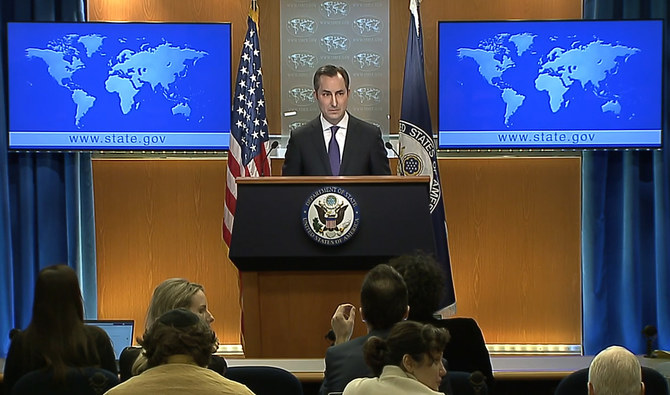ISLAMABAD: The United States (US) condemned recent Iranian airstrikes in Pakistan, Iraq and Syria, the State Department said on Wednesday, hoping that Islamabad and Tehran would resolve the issue peacefully.
The statement came a day after Pakistan said Iran had violated its airspace and attacked a border village, killing two children and injured three women. The raid occurred late Tuesday after similar attacks in Iraq and Syria.
Iranian news agency Mehr News said the “missile and drone” attack targeted the Pakistan headquarters of Jaish Al-Adl, a group formed in 2012 and blacklisted by Iran as a “terrorist group.”
Speaking at a press briefing, US State Department spokesperson Matthew Miller condemned the Iranian strikes and said Washington wanted to see peace and stability maintained in the region.
“We do condemn those strikes. We’ve seen Iran violate the sovereign borders of three of its neighbors in just the past couple days,” Miller told reporters in Washington.
“Certainly, we always want to see peace and stability maintained, especially in this region, where it’s been the focus of our diplomatic efforts since October 7th.”
Following the Iranian strike, Pakistan recalled its ambassador from Iran and blocked Tehran’s envoy from returning to Islamabad.
Mumtaz Zahra Baloch, a spokesperson for the Pakistani foreign ministry, called the attack near the country’s border “unprovoked” and a breach of Pakistan’s sovereignty.
Asked about possible retaliation by Pakistan, the US State Department spokesman said he hoped for a peaceful resolution of the issue.
In recent years, Jaish Al-Adl has carried out several attacks on Iranian soil.
Iran said the other missile attacks targeted “spy headquarters” and “terrorist” targets in Syria and Iraq’s autonomous Kurdistan region.
The strikes come as the Middle East has been rocked by Israel’s war on Gaza since Oct 7 and attacks by Yemen’s Houthi rebels on ships in the Red Sea.
“I think it is a little rich for at one – on one hand, Iran to be the leading funder of terrorism in the region, the leading funder of instability in the region; and on the other hand, claim that it needs to take this action – these actions to counter terrorism,” Miller added.
US condemns Iranian strikes on Pakistan, Iraq and Syria — State Department
https://arab.news/v6u33
US condemns Iranian strikes on Pakistan, Iraq and Syria — State Department

- Iran this week targeted alleged militant bases in Pakistan that Islamabad says killed two children, injured three women
- Tensions have since soared and Pakistan has recalled its ambassador from Iran, blocked Tehran’s envoy from returning
Pakistan’s president defends ongoing strikes in Afghanistan, urges Kabul to dismantle militants

- Afghanistan on Thursday launched attacks in retaliation for Pakistani airstrikes the previous Sunday
- Pakistan’s military says it is only targeting Afghan military installations to avoid civilian casualties
ISLAMABAD: Pakistan’s president on Monday defended his country’s ongoing military strikes in neighboring Afghanistan, saying Islamabad tried all forms of diplomacy before targeting militants operating from Afghan territory, and called on the Taliban government in Kabul to disarm groups responsible for attacks in Pakistan.
Pakistan earlier said it is in “open war” with Afghanistan, alarming the international community. The border area remains a stronghold for militant organizations including Al-Qaeda and the Daesh (Islamic State) group.
“(The Afghan Taliban) must choose to dismantle the terror groups that survive on conflict and its war economy,” Asif Ali Zardari said during a speech to lawmakers, adding that “no state accepts serial attacks on its soil.”
Afghanistan on Thursday launched attacks in retaliation for Pakistani airstrikes the previous Sunday. Since then, Pakistan has carried out operations along the border, with Information Minister Attaullah Tarar claiming the killing of 435 Afghan forces and the capture of 31 Afghan positions.
Kabul has denied such claims.
In Afghanistan, the deputy government spokesman Hamdullah Fitrat said Pakistan’s military fired mortar shells at a refugee camp in eastern Kunar province, killing three children and injuring three others.
Afghanistan’s defense ministry said Afghan forces carried out strikes targeting a Pakistani military facility near Paktia province, causing “substantial losses and heavy casualties.”
Pakistan’s military did not respond to questions. It has said Pakistan is only targeting Afghan military installations to avoid civilian casualties.
Pakistan has witnessed a surge of violence in recent months and blames it on the outlawed Pakistani Taliban, known as Tehreek-e-Taliban Pakistan or TTP. It operates both inside Pakistan and from Afghan territory.
Islamabad accuses Afghanistan’s Taliban government of providing safe havens for the TTP, which Kabul denies.
The latest cross-border fighting ended a ceasefire brokered by Qatar and Turkiye in October. The two sides failed to reach a permanent agreement during talks in Istanbul.
Zardari reiterated Pakistan’s call for talks, saying, “We have never walked away from dialogue.”
The Pakistani leader again accused Afghanistan of acting as a proxy for India by sheltering militant groups.
“Stop being used by another country as a battlefield for their ambitions,” he said.
Zardari cited a recent report from the United Nations Security Council’s monitoring team that described the presence of militant groups in Afghanistan as an extra-regional threat.










